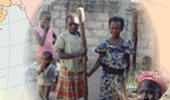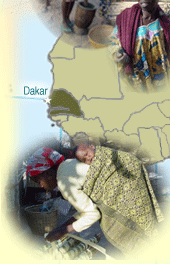
Strengthening Supervision of Community-Based Providers
PRIME II promoted the Performance Improvement (PI) approach to improving reproductive and child health services in Senegal through a series of national and regional skills-building activities. During 2001 PRIME conducted a PI short course for Francophone Africa in association with the Senegalese Institute of Public Health at the University of Dakar. Following the course, PRIME assisted participants from Kebemer health district in applying PI to implement a community-based services operations research project supported by Management Sciences for Health and the Population Council. As part of this project, PRIME designed and implemented a client-oriented approach to strengthen supervision of the community-based providers in Kebemer. In collaboration with the BASICS II project in Senegal and Guinea, PRIME also hosted a five-day PI workshop to build capacity for strengthening the performance of primary providers of child health services.
Key Results: The final evaluation of the two-year supervision activity in Kebemer found that 89% of the 69 community-based health providers sampled felt at ease with their supervisors, 81% had a performance workplan (compared to none prior to the intervention), and 94% stated that supervisory feedback had contributed to improved performance.
A Community Model for Postabortion Care
For a pilot project in Sokone district, the Ministry of Health requested PRIME II’s assistance to expand postabortion care (PAC) services to the primary and community levels, beyond where manual vacuum aspiration (MVA) is available. JHPIEGO and EngenderHealth had helped to establish PAC with MVA at regional and district hospitals in Senegal (including the health center in Sokone, which serves as a district hospital) and the MOH wanted a model for expanding PAC to rural health posts and health huts. PRIME applied the PI approach with key stakeholders from the central, regional, district and community levels to select interventions to close the gaps between desired and actual provider performance. The package of interventions included training, organizational support and community partnerships.
Key Results: The pilot led to significant improvements in performance by health post nurses; observation scores increased from 19% to 66% in infection prevention, 17% to 68% in family planning counseling, and 43% to 69% in digital curage (n=16 at baseline, 15 at final evaluation). In addition, the project demonstrated that clients would use the improved services and could be tracked through the new referral system. Client statistics from 13 health posts (of 14 in the district) over the year-long project illustrate, among other findings, that providers at the health posts will treat postabortion clients for complications that they are comfortable treating and will utilize the referral system when necessary. All 66 clients received by health posts benefited from FP counseling and 41 (62%) went home with FP methods. Health hut matrons, who were trained in referrals from the community level to the health posts, also began re-supplying FP users with assistance from PRIME.
|











